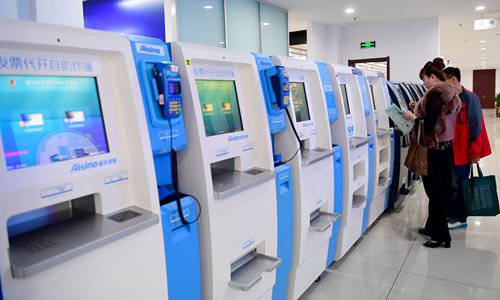
Residents in Shenyang, capital of Northeast China's Liaoning Province use machines to pay their taxes. (Photo: VCG)
China's top legislature recently voted to adopt the revised individual income tax law, a move experts said will create fairer income distribution as well as stimulating domestic consumption and securing a virtuous cycle in China's economic growth.
The new law stipulates that the minimum threshold for personal income tax exemption will be raised from 3,500 yuan ($513) to 5,000 yuan per month or 60,000 yuan per year. The new law will come into force on January 1, 2019, while some clauses including the minimum threshold for exemption will take effect on October 1 this year.
Dong Dengxin, director of the Finance and Securities Institute at the Wuhan University of Science and Technology, said that the new threshold of 5,000 yuan is reasonable as Chinese people's income has gradually increased in recent years thanks to the country's economic growth.
Dong told the Global Times on Monday that the change will benefit families with lower incomes and with the elderly and children to take care of, as the new law adds special deductions for items like children's education, treatment for serious diseases and caring for the elderly, as well as housing loan interest and rent.
The tax reform aims to seek fairer income distribution and a more equitable tax burden through helping lower-income people pay less tax while higher-income people pay more, Dong said.
The current law has undergone seven revisions since it was enacted in 1980, when the original threshold for individual income tax exemption was 800 yuan per month, according to the Xinhua News Agency.
It was raised to 1,600 yuan in 2005 and 2,000 yuan in 2007. The current threshold is 3,500 yuan according to the revision made in 2011.
After the release of the news about the new individual tax law, a chart showing a comparison of incomes based on the previous and new laws circulated widely online.
It said that an individual whose monthly salary is 5,000 yuan can get 4,080 yuan under the new law, compared to 4,625 yuan before, media reports said.
Wang Surong, a professor at the University of International Business and Economics, told the Global Times on Monday that "domestic enterprises will pay more in social security funds for their employees under the new law."
Domestic companies were likely to pay social security funds for employees on the basis of their minimum salary before, but now they have to pay the funds based on employees' actual salaries, according to Wang.
"More social security contributions may bring a heavier burden for small and medium-sized enterprises, but they are obliged to do that," Dong told the Global Times on Monday.
Release spending power
This round of income tax reform aims to guarantee fairer income distribution and to stimulate domestic consumption, Jia Kang, chief economist with the China Academy of New Supply-side Economics, told the Global Times on Monday.
Zhao Xijun, co-director of the Finance and Securities Research Institute at the Renmin University of China, agreed, saying that the new law will help adjust Chinese people's income and allow it to keep increasing.
Vice Minister of Finance Cheng Lihua said Friday that the law has taken into consideration the factors of per capita expenditure by urban residents, the average burden for those with jobs and the consumer price index.
Those with a monthly income below 20,000 yuan will see their tax cut by over 50 percent, Cheng said.
The new tax law will give poorer families more disposable income, which will help to stimulate domestic consumption, experts said.


